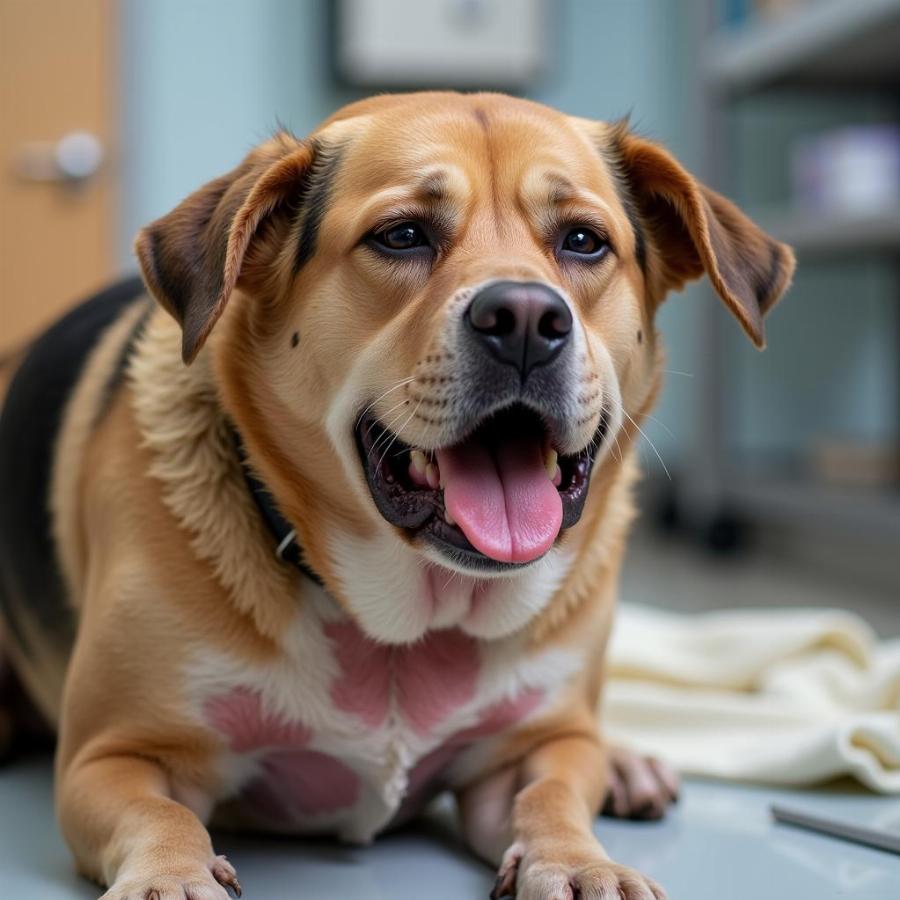Dog dry retching, also known as dry heaving, can be a concerning sight for any pet owner. It’s that distinctive, hacking sound and motion of vomiting without anything actually coming up. While it can sometimes be a harmless incident, it’s crucial to understand the potential causes of dog dry retching to determine if a trip to the veterinarian is necessary. This article will delve into the reasons behind dry heaving in dogs, offer guidance on when to seek professional help, and provide practical advice on caring for your furry friend.
What Causes Dog Dry Retching?
Several factors can contribute to dog dry retching. Some are minor, while others can indicate a more serious underlying health issue. Common causes include:
- Kennel Cough: This highly contagious respiratory infection often manifests as a harsh, dry cough, sometimes accompanied by dog dry retching.
- Blockage in the Throat: A foreign object lodged in your dog’s throat can trigger dry heaving as they attempt to dislodge it. This is a serious situation requiring immediate veterinary attention.
- Gastric Dilatation-Volvulus (GDV) or Bloat: This life-threatening condition occurs when the stomach fills with gas and twists, cutting off blood supply. Dry heaving is a potential symptom of bloat, along with restlessness, a distended abdomen, and excessive drooling.
- Nausea: Just like humans, dogs can experience nausea, which may lead to dry retching. This can be caused by various factors, including dietary indiscretion (eating something they shouldn’t), motion sickness, or certain medications.
- Esophagitis: Inflammation of the esophagus can also cause dry heaving, often accompanied by difficulty swallowing and regurgitation.
When is Dog Dry Retching an Emergency?
While occasional dry heaving might not be cause for immediate panic, certain accompanying symptoms warrant a trip to the veterinarian:
- Bloated or distended abdomen: This could be a sign of GDV, a life-threatening emergency.
- Difficulty breathing or excessive panting: This could indicate a blockage in the airway.
- Lethargy or weakness: These signs, coupled with dry heaving, suggest a more serious underlying illness.
- Pale gums: Pale gums can indicate shock or anemia, which can be associated with serious conditions.
- Repeated and prolonged dry heaving episodes: If your dog is dry heaving frequently and for extended periods, it’s crucial to seek veterinary care.
 Các triệu chứng nguy hiểm khi chó bị nôn khan
Các triệu chứng nguy hiểm khi chó bị nôn khan
Home Care and Treatment for Dog Dry Retching
If your dog’s dry retching appears mild and infrequent, and they’re otherwise behaving normally, you can try some home care strategies:
- Withhold food for a few hours: This allows the digestive system to settle.
- Offer small amounts of water frequently: Dehydration can worsen the situation.
- Monitor for any changes in behavior or symptoms: If the dry heaving continues or worsens, contact your veterinarian.
Why is my dog dry heaving?
Your dog might be dry heaving due to a variety of reasons, ranging from kennel cough to a serious condition like bloat. It’s important to observe your dog for other symptoms and consult with your veterinarian for a proper diagnosis and treatment plan. dogs dry heaving can be a sign of a simple issue or something more serious.
Signs of Nausea in Dogs
Recognizing signs of nausea in dogs is essential for prompt treatment. Alongside dry heaving, look for excessive lip licking, drooling, and restlessness. These can indicate your dog is feeling unwell and requires attention.
What to Do If Your Dog is Dry Heaving
If your dog is experiencing dry heaving episodes, it’s always best to err on the side of caution and consult your veterinarian. why is my dog dry heaving can be difficult to determine without professional guidance. They can assess your dog’s condition, perform necessary tests, and provide the appropriate treatment.
Conclusion
Dog dry retching can be a sign of various health issues, some minor and some requiring immediate veterinary attention. Understanding the potential causes and recognizing accompanying symptoms is crucial for ensuring your dog’s well-being. While some cases of dry heaving resolve on their own, it’s always best to consult with a veterinarian, especially if the dry retching is persistent or accompanied by other concerning signs. Prompt diagnosis and treatment can make a significant difference in your furry friend’s recovery.
FAQs
-
Is dog dry retching always serious? No, not always. It can be a simple issue like kennel cough or nausea, but it can also be a sign of a more serious problem like bloat.
-
What should I do if my dog is dry heaving and has a bloated stomach? Contact your veterinarian immediately as this could be a sign of GDV, a life-threatening condition.
-
Can I give my dog medication for dry heaving? Never give your dog human medication without consulting your veterinarian. Some medications can be toxic to dogs.
-
How can I prevent my dog from dry heaving? Ensure your dog has access to fresh water, avoid feeding them table scraps, and keep small objects out of their reach.
-
Is dry heaving the same as vomiting? No. Dry heaving is the motion of vomiting without producing any vomit.
Beaut Dogs is your trusted source for comprehensive and reliable information about dog breeds, care, and health. We are dedicated to providing valuable resources for dog lovers everywhere. For expert advice and personalized support, contact us at Email: [email protected]. We’re here to help you provide the best possible care for your canine companion. Beaut Dogs at https://beautdogs.com understands that every dog is unique and deserves individualized attention.